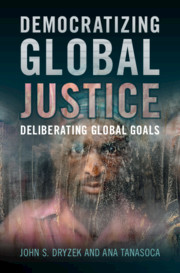Book contents
- Democratizing Global Justice
- Democratizing Global Justice
- Copyright page
- Contents
- Preface
- List of Abbreviations
- 1 Introduction
- 2 Agents of Justice
- 3 Democratizing Formal Authority
- 4 Democratizing Money
- 5 Democratizing the Power of Words
- 6 Empowering the Many
- 7 Democratizing Intergenerational, Interspecies, and Ecological Justice
- 8 Global Justice in the Deliberative System
- 9 Conclusion
- References
- Index
3 - Democratizing Formal Authority
States and International Organizations
Published online by Cambridge University Press: 21 May 2021
- Democratizing Global Justice
- Democratizing Global Justice
- Copyright page
- Contents
- Preface
- List of Abbreviations
- 1 Introduction
- 2 Agents of Justice
- 3 Democratizing Formal Authority
- 4 Democratizing Money
- 5 Democratizing the Power of Words
- 6 Empowering the Many
- 7 Democratizing Intergenerational, Interspecies, and Ecological Justice
- 8 Global Justice in the Deliberative System
- 9 Conclusion
- References
- Index
Summary
States and international organizations are central to global governance, and are significant formative agents of justice (and injustice), in advancing, sifting, or undermining principles. Despite their formal authority, states and international organizations cannot be relied upon to promote global justice. States in practice often veil their material self-interest in the language of justice. International organizations too can promote their own interest, as well as adhering rigidly to dominant discourses such as neoliberalism that restrict the kind of justice they can advance. Thus states and international organizations should primarily act as effectors of global justice whose task is to ensure the outcomes determined in more extensive deliberation are implemented. Some of their problematic formative agency aspects can be ameliorated by deliberative democratic means. The Open Working Group that finalized the content of the Sustainable Development Goals is indicative of the possibilities here, as it embodied novel deliberative features that curbed polarization, overcame impasse, and facilitated common-interest justifications. Engagements with civil society of the kind now glimpsed in global climate governance can open international organizations to deliberating competing conceptions of justice. This chapter concludes by showing how states and international organizations might expand their deliberative engagements.
Keywords
- Type
- Chapter
- Information
- Democratizing Global JusticeDeliberating Global Goals, pp. 58 - 79Publisher: Cambridge University PressPrint publication year: 2021

